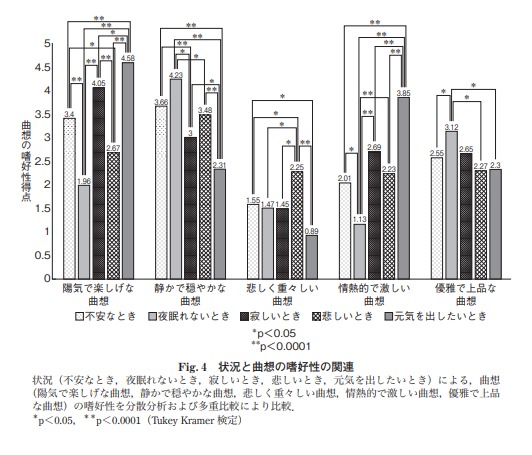音楽の起源

人類で最初の音楽は、歌や打楽器だったのではないかと思われます。
我々がそうであるように、自分たちの感情を声の高さや大きさで表現していたのではないでしょうか。
また同時に、手を叩いたり、ものをぶつけて音にしたりする技術も自然に身についていったのではないでしょうか。
世界最古の笛というものは、今から約40,000年前に作られています。
それは骨に穴を開けて息を吹くことで音楽にしていたようです。
歴史は常に変わっていくので、もっと昔に別の形の楽器が見つかるかもしれません。
いずれにせよ、我々人類ははるか昔から音とふれあい、音とともに進化・進歩していったことでしょう。
音楽と感情
音楽を聞いて気分が変わった経験は多くの人が経験したことがあるでしょう。
楽しさ・安らぎ・悲しさ・虚しさ・感動など様々な感情へと音楽は変えてくれます。
音楽心理学や音響心理学という学問があることからも、音楽が人間に与える影響は大きく、またまだまだ未知数なことが多いことがわかります。
感情をコントロールしながら生きていくために、音は大きな要素になっていることは間違いありません。
逆に言えば音をうまく使うことができれば感情をコントロールすることができます。
感情にあった音楽を奏でることで自分の気分が変わるのはもちろんです。
ただそれ以上に音楽を聞いている周りの人を喜ばせたり、楽しませたり、感動させたりすることができるのです。
音楽の好みと脳への影響

日本音楽心理学音楽療法懇話会会長を努めておられる貫 行子氏(2018年現在)らによる論文では以下のように述べられています。
<前略>
脳波平均周波数や傾き係数には統計学的な有意差は認められず、感性的嗜好と脳波ゆらぎの間に明確な関連性は見いだせなかった。
<中略>
聞き慣れた音楽の違いが脳機能に反映する可能性が示唆された。
つまり音楽の脳へ与える影響は、個人の好き嫌いに関係なく、リラックスできるような(例えばモーツァルトのアイネ・クライネ・ナハトムジークのような)曲はリラックスでき、気分が高揚するような現代のEDMのような曲は、気分が高まる効果があるということです。
しかし初めて聞く曲よりも聞き慣れた曲であればあるほど、先の展開が予想できるからか、脳への影響は大きくなる。演歌を聞き慣れている人であれば、演歌でリラックスできたり、気分が高揚することが期待でき、洋楽を聞きなれているのであれば、洋楽のほうが影響が大きいということです。
なんでもそうですが、新しいものを見たり聞いたりするのは疲れを感じやすくなりますから、それが影響するのかもしれませんね。また、昔の歌謡曲などがテレビで放映されているときに、世代があっていれば見たくなるのはコレが理由でしょう。
音楽の好みと精神的心理状況

一方で尾辻美沙氏、佐藤菜保子氏による論文によると
聞き手の精神的健康状態によりBGMの音の種類、曲想の嗜好性に差があることが分かり、抑うつ傾向の低い人ほどBGMを聞きたいと思っていることが明らかになった。
と述べられています。
つまり、聞き手の精神的な状態によって、聞きたい曲が変わってくるということです。
先程の貫 行子氏の論文と合わせてみると、
「個人の好き嫌いは別に、そのときの精神状態によって聞きたい曲は変わってくるし、聞き慣れた曲ほど脳への影響は大きくなる」
ということですね。
最後に
両論文ともに理系の私からすれば「統計的」と呼ぶにはあまりにも母体が少ないと思いますが・・・
人間は本能的に、自分の精神状況を安定させたり準備したりするために、それに合った音楽を求めているのでしょう。
音楽は不思議ですばらしいものです。
ぜひ皆さんも音楽で周りの人の人生をよりよいものにしていきましょう

コメントを残す